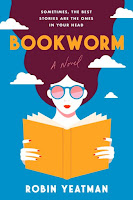Author: Hilary Leichter
Publication Information: Ecco. 2023. 208 pages.
ISBN: 0063265818 / 978-0063265813
Rating: ★
Book Source: I received this book through NetGalley free of cost in exchange for an honest review.
Opening Sentence: "The old window gave a grant view of Yellow Tree, trunk to branch.
Favorite Quote: "Grief is not the door that tucks you in; it's the door that shuts you out."
The book description reads as follows. "Based on the National Magazine Award–winning story, Hilary Leichter’s profound second novel asks how we nurture love when death looms over every moment. From one of our most innovative and daring writers, Terrace Story is an astounding meditation on loss, a reverie about extinction, and a map for where to go next."
The book description reads as follows. "Based on the National Magazine Award–winning story, Hilary Leichter’s profound second novel asks how we nurture love when death looms over every moment. From one of our most innovative and daring writers, Terrace Story is an astounding meditation on loss, a reverie about extinction, and a map for where to go next."
As a reader, I am not sure I understand what this book is about or how to capture the promise of this description.
The premise is as follows. An individual somehow has the ability to expand the physical space they are in. How or why? Controlled or uncontrolled? Privilege or curse? This is either never truly explained, or again, I just don't understand.
The book reads like interlinked short stories or novellas. If you keep the names straight, you see the characters connect from one to the other. Maybe.
The book description poses questions. "How far can the mind travel when it’s looking for something that is gone? Where do we put our loneliness, longing, and desire? What do we do with the emotions that seem to stretch beyond the body, beyond the boundaries of life and death?" Having read it, I am not sure the book provided the answer, or again, perhaps I just don't understand.
Based on the idea of being able to expand time and space, the book could be a science fiction story. However, it is not. The premise is never really explained, or maybe I just don't understand. Regardless, the exploration of the science is clearly not the focal point. I somewhat wish that it was for that thread might have tied the whole book together.
Based on the same idea, the book could be a fantasy for the worlds that life in that expansion. However, this book does not go in that direction either. The expanded space is just that - a terrace beyond an apartment, a ceiling that seems higher, etc. No fanciful worlds or adventures exist beyond. Perhaps, this thread may have tied the book together for me, but that was not the point.
I do persevere to the end of the book, hoping the ending will bring all the different threads together. Sadly, for me, it does not. At the end, I walk away frustrated and completely not understanding. It seems a book that tries too hard to make a philosophical point that unfortunately is lost on this reader.
Please share your thoughts and leave a comment. I would love to "talk" to you.















